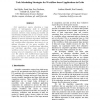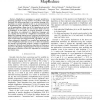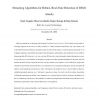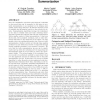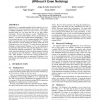179 search results - page 33 / 36 » Parallel k h-Means Clustering for Large Data Sets |
CCGRID
2005
IEEE
14 years 4 months ago
2005
IEEE
Grid applications require allocating a large number of heterogeneous tasks to distributed resources. A good allocation is critical for efficient execution. However, many existing ...
ICDE
2011
IEEE
13 years 2 months ago
2011
IEEE
Abstract—MapReduce is emerging as a generic parallel programming paradigm for large clusters of machines. This trend combined with the growing need to run machine learning (ML) a...
ICDCS
2007
IEEE
14 years 5 months ago
2007
IEEE
Effective mechanisms for detecting and thwarting Distributed Denial-of-Service (DDoS) attacks are becoming increasingly important to the success of today’s Internet as a viable ...
EDBT
2010
ACM
14 years 5 months ago
2010
ACM
Since the visualization real estate puts stringent constraints on how much data can be presented to the users at once, table summarization is an essential tool in helping users qu...
PVLDB
2010
13 years 9 months ago
2010
MapReduce is a computing paradigm that has gained a lot of attention in recent years from industry and research. Unlike parallel DBMSs, MapReduce allows non-expert users to run co...
